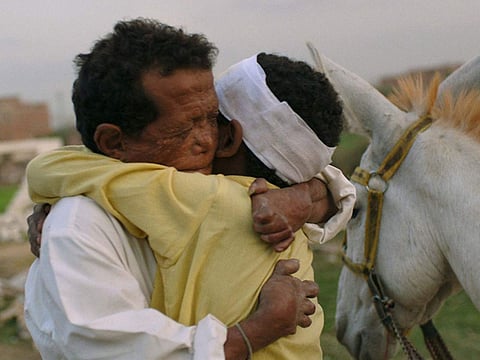Egyptian film on leprosy praised for emphasising humanity
‘Yomeddine’, which premiered at Cannes, exposes prejudice against the vulnerable

Having spent his life at a leper colony north of Cairo, Beshay, a Coptic man sets out on an eye-opening journey searching for his family roots in Upper Egypt.
Accompanied by his donkey and a young orphan nicknamed Obama, the lead character of the unconventional film Yomeddine (The Day of Judgement) exposes communal bias against the infirm and the vulnerable during his trip to his family’s hometown in Qena, south of Cairo.
Beshay, played by ex-leper Rady Gamal, is shunned by people who erroneously believe that leprosy is contagious. The illness has heavily disfigured his face and hands.
The expression Yomeddine is invoked in the course of the road film in a reference to the Day of Judgment when all people will be equal regardless of their colour or race.
“The underlying message of the film is a call for humanity,” said Shafiq Sobhy, an entertainment critic, told Gulf News tabloid!.
“The protagonist faces prejudice not just because he is poor or belongs to the Christian minority. He is ostracised by people, who are ignorant of his disease and dislike different [people],” Sobhy said.
“The film is a strong statement on mankind’s crisis and the ordeal of the marginalised around the world. It’s a universal film in its own right that prods people to look beyond deformities and accept differences,” he added.
Yomeddine is the debut fiction film from Egyptian-Austrian director Abu Bakr Shawky, who also wrote its script. In May, it had its world premiere at the Cannes Film Festival where it was awarded the Francois Chalais Prize for its portrayal of coexistence.
Yomeddine had its Egyptian premier last week at the El Gouna Film Festival in the Red Sea resort of Hurghada. It claimed the festival’s Best Arab Feature Film Prize and shared the event’s Cinema for Humanity Prize with another film.
Founder of El Gouna Festival, Egyptian business tycoon Naguib Sawirisis, lauded Yomeddine for its humanitarian message.
“I cried twice while watching this film at Cannes and El Gouna,” Sawiris said in a television interview.
“The film reminds me of people’s suffering and what is happening in the world,” he added.
Egypt has nominated Yomeddine for the Oscar’s best foreign film category.
“Yomeddine has imparted the message of the outcasts across the world in the best way,” said Ahmad Al Saway, a writer in private newspaper Al Masry Al Youm. “It is hard to ignore or underrate this film as it diagnoses an illness that is harsher than leprosy, namely prejudice.”
“This film, its theme... and makers deserve all support as they present an example that can reshape the cinematic picture away from recurrent themes and big-name actors,” Al Sawy argued.
Makers of Yomeddine chose the Upper Egyptian province of Minya, the hometown of the lead actor, as the first venue for its commercial screening in the country last week.
Shawky, the 32-year-old director, said that the idea of Yomeddine first came to him about 10 years ago when he made a documentary about the leper colony in the suburb of Abu Zabal north of Cairo.
On preparing for the film, Shawky picked Gamal and auditioned him for four months before the actual shooting began.
The rookie director defended his selection of Gamal although he had no acting background.
“It was an inevitable choice because Gamal experienced [leprosy] in real life... and as such he is the most aware of the problems associated with this disease and its psychological impact,” Shawky said at the El Gouna Festival. “He is such a kind-hearted, smart and spontaneous person whose performance drives home the message.”


